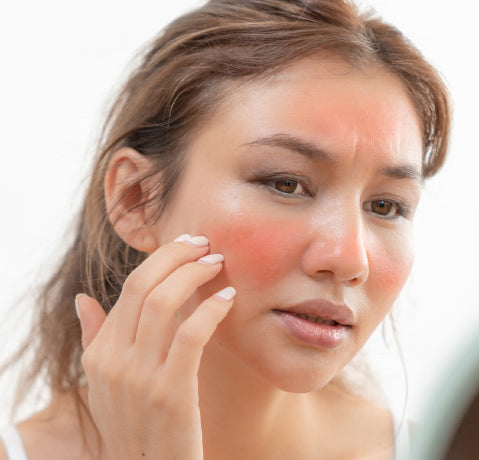“What is the difference between sensitive and sensitized skin?”
Sensitive is a skin TYPE. You are born with it, it’s genetics.
Sensitive skin lets irritants, microbes and allergens pass through its protective outer layer, causing reactions like redness, stinging, itching, tightening, pain or flushing. Genetically sensitive skin tends to have a lower amount of pigment, a thin (more translucent) top layer, and blood vessels closer to the skin surface that are giving the appearance of redness. The genetically sensitive skin may also be prone to asthma and allergies.
Sensitized skin is sensitive skin CAUSED BY OUTSIDE FACTORS, and it can be triggered in anyone, regardless of genetics. Sensitized skin is temporarily reactive as the result of coming into contact with something externally.
Sensitizing factors could be:
• Pollution
• Lifestyle
• Irritants
• Cosmetic products that include alcohol, fragrance, or artificial color.
Think of sensitized skin as a temporary situation, while sensitive skin is a skin type that needs specific products and ingredients. Like oily skin for example; oily skin is also a skin type that requires specific products to be used in the routine. Using products that are not in line with what oily skin needs, will wreak havoc in feel and appearance. It’s the same for sensitive skin. It has special needs (we love her!) and should be handled as such.
If you tend to get sensitized skin on a regular basis, keep a diary to identify what’s triggering it and speak with a board-certified dermatologist who can make the final verdicts. I suggest doing an allergy test to rule out or identify any specific triggers as well.
How To Manage Sensitive Skin and Repair Sensitized Skin
The approach these 2 have in common, is the need to use gentle products to help skin’s barrier support. When the barrier is damaged, it’s less likely to protect itself from common ingredients and aggressors.
The protocol for both would focus on paring down ingredients that are known irritants and simplifying the routine.
Avoid These Specific Triggers
Products with “Fragrance” are little devils. There can be up to 200 individual ingredients going into formulating a “fragrance”, and only “fragrance” has to be listed in the ingredients list. That’s SCARY frankly, and the reason why fragrances account for 30% to 45% of reactions in cosmetic products and are most likely to cause allergic contact dermatitis.
If you’re getting sensitized skin, do an inventory of everything that comes in contact with your skin: skincare products, makeup products, cleaning supplies/detergents, shower gels, soaps, shampoos, perfumes, body creams, even the wipes you may be using to wipe the glasses that come in contact with your skin.
A simple removal of fragrance could be life changing.
Protect From Pollution and Environmental Stressors
Goes without saying that pollution and exposure to stressors are awful for the skin. Especially when you factor in the DAILY exposure to them.
The 4-In-1 Multipurpose Booster Serum is a multitasking product formulated to protect the skin from pollution and blue light stress. It’s giving powerful results yet it was specifically formulated to be used on BOTH face and eye area, making it powerful yet incredibly gentle. Dermatologist approved for ALL skin types to be exact. And using 1 product for 2 areas saves time and money as well.
Just 2 drops every morning and evening will hydrate within different levels of the skin, it will soothe it, and help it give you that beautiful, natural, healthy and youthful glow.
An Overload of Skincare Products
The 10-step Korean skincare is not for everyone. Literally!
More often than not, it’s the skincare regimens that are leading to sensitized skin. Here you are thinking that an intricate skincare routine is what’s going to help clear the skin and keep it youthful… when in fact it may be that routine that’s causing irritation, redness, and potential dryness.
Fact Is:
Our skin does a great job at protecting itself by producing oil. Natural oil production creates a barrier that works to keep environmental irritants out. So let’s allow her to do her job.
Simplifying your routine in terms of amount of products (formulated without fragrance – both synthetic or natural) can make a huge difference. Think gentle double cleanse, a multitasking lightweight serum that’ll hydrate, a calming moisturizer and zinc oxide (mineral) sunscreen during the day. At night, a skin-type appropriate oil to top off the routine can be significant as well. Everything should be free of alcohol, essential oils, fragrance, and other harsh ingredients.
PRO TIP:
When introducing any new product into your routine, do a patch test on the inside of the wrist or behind the ear, to first determine if a reaction occurs. If it does, let’s not even think about using that product. If there’s no reaction, introduce the product slowly rather than daily or twice daily.
Use Exfoliating Acids Very Carefully
It’s best to avoid harsh exfoliating acids, generally including lactic, glycolic, citric and salicylic acids. You’d want to make sure you are using an exfoliator formulated specifically for sensitive skin.
Avoid Hot Water
Hot water can dehydrate skin by stripping it of the natural oils it needs to stay healthy. This can lead to dry skin, itching and irritation as well as potentially increased inflammation in the skin. Below 85 degrees Fahrenheit (29.4 Celsius) is the way to go.
Hope this helped! We love you!

